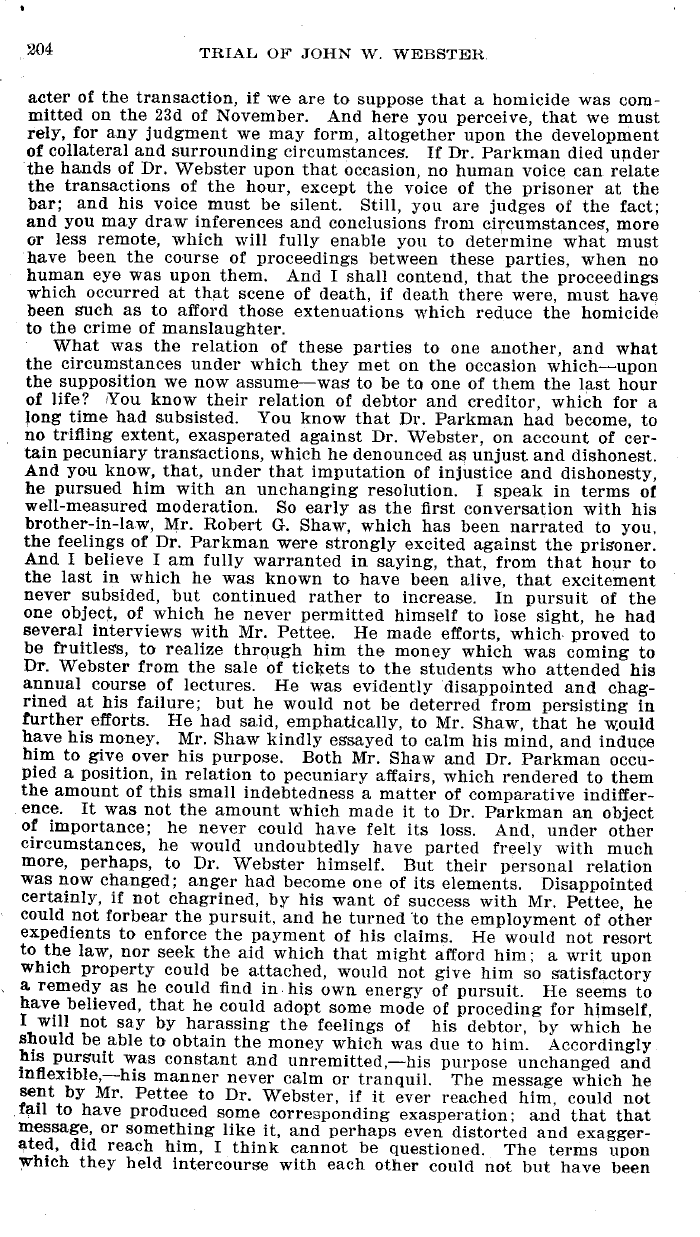|
204 TRIAL OF JOHN W. WEBSTER.
acter of the transaction, if we are to suppose that a homicide was com-
mitted on the 23d of November. And here you perceive, that we must
rely, for any judgment we may form, altogether upon the development
of collateral and surrounding circumstances. If Dr. Parkman died under
the hands of Dr. Webster upon that occasion, no human voice can relate
the transactions of the hour, except the voice of the prisoner at the
bar; and his voice must be silent. Still, you are judges of the fact;
and you may draw inferences and conclusions from circumstances, more
or less remote, which will fully enable you to determine what must
have been the course of proceedings between these parties, when no
human eye was upon them. And I shall contend, that the proceedings
which occurred at that scene of death, if death there were, must have
been such as to afford those extenuations which reduce the homicide
to the crime of manslaughter.
What was the relation of these parties to one another, and what
the circumstances under which they met on the occasion which-upon
the supposition we now assume-was to be to one of them the last hour
of life? ,You know their relation of debtor and creditor, which for a
long time had subsisted. You know that Dr. Parkman had become, to
no trifling extent, exasperated against Dr. Webster, on account of cer-
tain pecuniary transactions, which he denounced as unjust and dishonest.
And you know, that, under that imputation of injustice and dishonesty,
he pursued him with an unchanging resolution. I speak in terms of
well-measured moderation. So early as the first conversation with his
brother-in-law, Mr. Robert G. Shaw, which has been narrated to you,
the feelings of Dr. Parkman were strongly excited against the prisoner.
And I believe I am fully warranted in saying, that, from that hour to
the last in which he was known to have been alive, that excitement
never subsided, but continued rather to increase. In pursuit of the
one object, of which he never permitted himself to lose sight, he had
several interviews with Mr. Pettee. He made efforts, which. proved to
be fruitless, to realize through him the money which was coming to
Dr. Webster from the sale of tickets to the students who attended his
annual course of lectures. He was evidently disappointed and chag-
rined at his failure; but he would not be deterred from persisting in
further efforts. He had said, emphatically, to Mr. Shaw, that he would
have his money. Mr. Shaw kindly essayed to calm his mind, and induce
him to give over his purpose. Both Mr. Shaw and Dr. Parkman occu-
pied a position, in relation to pecuniary affairs, which rendered to them
the amount of this small indebtedness a matter of comparative indiffer-
ence. It was not the amount which made it to Dr. Parkman an object
of importance; he never could have felt its loss. And, under other
circumstances, he would undoubtedly have parted freely with much
more, perhaps, to Dr. Webster himself. But their personal relation
was now changed; anger had become one of its elements. Disappointed
certainly, if not chagrined, by his want of success with Mr. Pettee, he
could not forbear the pursuit, and he turned to the employment of other
expedients to enforce the payment of his claims. He would not resort
to the law, nor seek the aid which that might afford him; a writ upon
which property could be attached, would not give him so satisfactory
a remedy as he could find in. his own energy of pursuit. He seems to
have believed, that he could adopt some mode of proceding for himself,
I will not say by harassing the feelings of his debtor, by which he
should be able to obtain the money which was due to him. Accordingly
his pursuit was constant and unremitted,-his purpose unchanged and
inflexible,-his manner never calm or tranquil. The message which he
sent by Mr. Pettee to Dr. Webster, if it ever reached him, could not
fail to have produced some corresponding exasperation; and that that
message or something like it, and perhaps even distorted and exagger-
ated, did reach him, I think cannot be questioned. The terms upon
which they held intercourse with each other could not but have been
|

